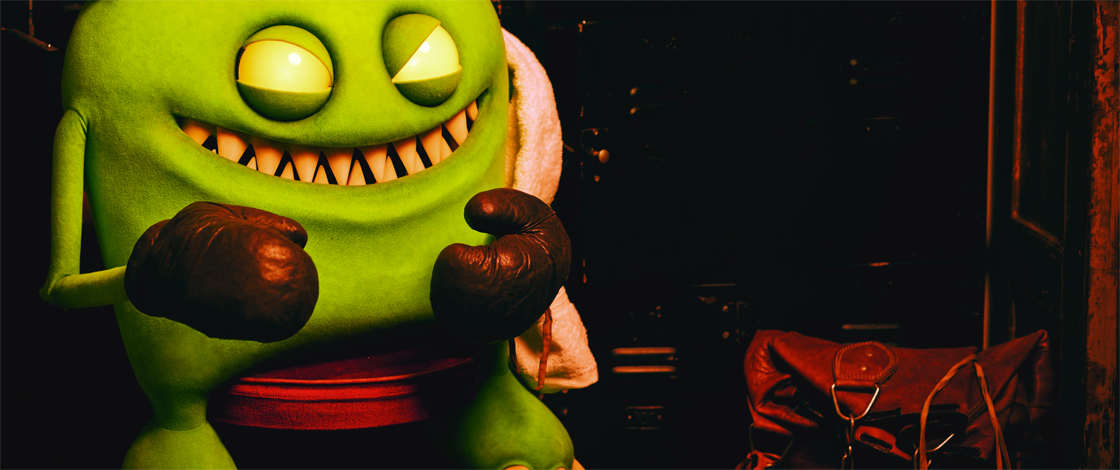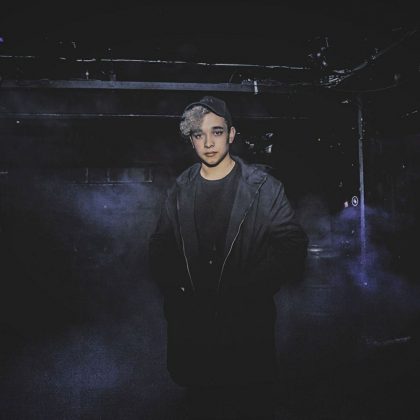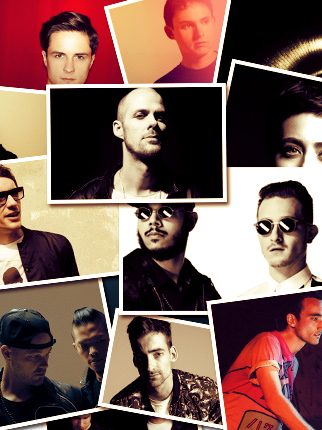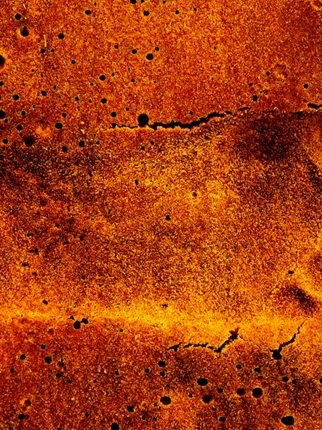Feed Me and the Alchemy of Creativity

From his early success in drum & bass as Spor to his unstoppable Feed Me moniker, Jon Gooch is no stranger to the spotlight. Revered for his ability to deliver chart-topping floor-killers in genres as varied as electro house to dubstep on imprints that range from mau5trap to his own ever-impressive Sotto Voce, the London-based producer seems to have achieved a level of notoriety that is equal to his shape-shifting evolution as an artist throughout his career.

As we close in on Feed Me’s takeover of Awakening this Friday at the ExchangeLA, we thought we’d take a step back from the dancefloor and reflect on the often underappreciated, yet equally stunning, talent that Jon has cultivated in the visual arts from a young age. Originally used as a form of self-therapy and escape, the imaginative world that Jon found at his fingertips would lead him on a journey to early design work on platforms like Windows XP and Xbox, as well as serve as the backbone for a career built on trusting his instincts, following his passion, and living life on his own terms. While his musical productions may have overshadowed his work in the visual arts, Jon sees them as one and the same, conjuring up dreams and visions as only he knows how to do.

Do you come from a creative family where artistic expression was encouraged?
I’ve been drawing as long as I can remember. I was pretty quiet as a kid. I spent a lot of time drawing—escaping, really. I remember my dad drawing a little bit, but he’s an engineer, so he has quite a technical mind—not sure where my creative side came from, to be honest with you.

I always had a keen interest in science fiction and fantasy—anything that was otherworldly—but I used to watch a lot of cartoons, animation. My dad used to record a lot of anime, which we used to watch as well. Some of it was appropriate; some of it wasn’t, now that I think about it.
I always had a kind of urge to draw, and I remember getting called aside in school a lot about it. For a long time, that was the only thing I was fully interested in at school. I’d spend most of my hours there drawing, regardless of whether it was required or not; it was my principal past time. For most of my life, I foresaw myself doing that. Music was just an accident.
As you got older, the internet was coming into its own, culturally. I know you were heavily involved in DeviantArt, which continues to be a huge online community of artists and shaped your early experiences in some important ways.
Absolutely. I think I was the 80th member of DeviantArt or something like that; I definitely have one of the oldest accounts on the site. I used to hang out in IRC chat with the people who ran it and, through that site, eventually got picked up to do commission work when I was in my mid-teens. My coding was terrible, but I could draw, so I got picked up by a company that was doing Windows Media Player design. Then I did some work on Windows XP, Xbox—a whole gang of stuff. It was all exciting, as that was the first time I got paid for creativity, and it kind of proved that I hadn’t been wasting my time.
Were you actually considering art/design/programming as a career at this point?
Not really. I didn’t really have any ambition to create a career; it was just a thought that I was starting to take seriously, I suppose. More than anything, it was good validation for what I would get into later on, as just having someone do that once can be really encouraging. But at the time I was still messing around, I took like a pre-college course on art, fine art and design, and then I went and did model design at [university], which focused on special effects, architecture, and product design.
Where were your influences coming from at that time?
I got really into anatomy at school. I was always interested in biology to a degree, so I liked the kind of construction and makeup of people and portraying their anatomy. A lot of stuff I used to draw was character-based, and for me, I wasn’t just drawing a picture; I was drawing a character that I would be able to draw again in a different environment. I think that’s why I was drawn to anatomy, as it focuses on being able to imagine the object in three dimensions.
Frank Frazetta was an early influence for me, as he was for a lot of people. The more impressionist and acrylic-based graphic novel stuff was one of the top influences for me, and like a lot of kids into science fiction and art at the time, I was really into H.R. Giger as well. Aside from being responsible for designing the alien in the Alien films, he was generally an eccentric bloke—I liked the personality of him, too.
What did your parents think of all this?
Initially, they were very confused. I’d go from Photoshop and open FL Studio and make some random 300-BPM, weird experimental thing and then close it again, and I guess all they saw was weird things on the screen and strange noises coming out of my room. But once I started getting stuff arriving in the mail from companies like Xbox and whatever, I think they started to take it seriously. They’ve always been supportive of my creativity. I never went short of art supplies, and we weren’t a well-off family or anything, but they helped put me through my education—which I eventually quit and ran away from [laughs]. But through it all, my parents have always been very supportive and patient; I’ve got nothing but good things to say about that.
Your early explorations into music were taking place around the same time?
I was just randomly making pieces of music, but I didn’t know any people that were musicians, so I didn’t really know what to do with it. I suppose I started taking music seriously when I got into drum & bass, which happened just by pure chance. I would sit next to my friend Martin in science class, and one day we got to talking about how I had a program on my computer where you could make electronic music. He took a lot of interest, so I brought some music in on a CD. He was like, look, it’s all over the place; you’d be better off making one thing, and then we can actually try and get someone to put it on a record for us.
I thought it would be pretty rewarding to get a physical product out of it, so that’s what we started working toward. I wasn’t interested in clubbing or gigs, or anything like that. He was already DJing in the local area, so I would just go and watch him play music we made. The whole experience made me analytical as well, because I realized quite quickly that hearing music on a big sound system was quite different than hearing it on your home speakers. I never had any production education or lessons or courses or anything, and I never had any legitimate equipment until I was well into my 20s, so I was kind of guessing.
How did you see the music as being aligned with your visual work, and do you see them as coming from a similar place?
I think with drum & bass especially, the labels I got into were all kind of science fiction-orientated—artists like Dillinja, Ram Trilogy, Ed Rush & Optical—they all made this really techy, futuristic-sounding music, which to me was really exciting and felt like it was a different world.
In terms of my creative process, I think they come from the same place, in that I was always doing them simultaneously. I always had music on when I was working on my visual art, and when I was making music, I was thinking quite visually as well. A lot of people talk about synesthesia and seeing sounds and hearing colors, and I never quite had that. To me, it’s more like movement and dynamics, and whether you’re doing that with paint or pencil or sound, to me it’s all the same.

Do you always know where you’re going with a project, or is it coming from a more exploratory or meditative space?
If I’m in a good mood, I don’t really need to think about it too much. Most of my energy is spent getting myself in that situation, making sure I get enough sleep. Or recently, I just moved and rebuilt a studio from the ground up, so being in a proper creative space is essential. When I sat down in it for the first time, I didn’t want to leave, so I just basically sat there for three days.
The same with drawing, I think. If I can get a good headspace going, I don’t really think about it. But this all depends on the quality of the work you’re drawing as well, because more than audio work, it requires more forward planning. I know I can fill a page in a sketchbook with some fun ideas, but if I want to produce something that I intend to be a really strong idea, then I’ll draft it a few times and refine it—use different media, build it up—so it ends like an airbrushed piece or painted or whatever. I think preparation is more important with the visual aspect.
The way that both projects are experienced is different as well. People interpret music over time—a song is something you experience over the course of two to eight minutes—but the painting is something you experience all at once and then slowly re-experience. So you look at it and you process it, but you can’t tell me what the end of a song is before you’ve heard the whole thing. So I think that passage of time and the time it takes to interpret art is what separates music and the visual.
Do you have any rituals that help you enter into that creative space?
Not really. As I’ve gotten older, it’s just finding the time, really—that, and finding ways to not be interrupted or distracted. I don’t think I realized how much free time I had until I was on tour for three years! When I was younger, I could sit in the room all week and not really be disturbed. But nothing makes me happier, so it doesn’t feel like hard work to sit down and get on with something creative. As long as I feel like I’m going to be able to spend the time I want doing this, then I’m quite happy to get on with it. Coffee is helpful, though; I don’t really sleep that much.

Is there any tension or anxiety around your creative work becoming more or less a job?
Luckily, not everyone around you always interprets having a creative-based career as being a real job. You meet an old school friend, and they’ve been watching you over the years, and they think you’re still just fucking around, or you’re delaying getting an office job. It’s hard for them to realize that this is what you do. I don’t really know what else to do—it feels kind of inevitable now, and I’ve never really looked back.
What about this tension between being underground and selling out?
I’ve never worried about it. I’ve got too much appreciation for Pixar and Disney and someone who created a five-minute, offbeat animation, to up-and-coming musicians and established artists. I think if anything, the wide range of people working in creative fields is an example of how the internet has kind of opened up the playing field, so that you can take your creative impulses in the direction you want to take it.
The whole point of starting Feed Me was to make music that was somewhat free, so there wouldn’t be a case of selling out or doing something I didn’t like—especially because I presented it to people with the idea from the beginning that it was going to be everything, and I didn’t set any restrictions from the onset. I think it works. In drum & bass, I fell into a gap where I was producing to fit a role—which was exciting, too. It was like playing a character, in a way: You turn up and get into character, and it’s exciting. But with Feed Me, I don’t get a day off or an afternoon where I don’t really feel like Feed Me, as I’m doing it all the time.
You seem like you’re in a good space right now, where the machine is taking care of itself, in terms of success. But you’re also able to branch out and seek out new opportunities in a way maybe you didn’t have access to 10 years ago.
Well, I’m not infallible; I wouldn’t have done this interview six months ago. I was really pissed off, mainly from the process of moving. We had hit a lot of delays, and it was a lot more work than I’d anticipated. I was touring Spor stuff, but it was very cut up. I was back and forth from the airport continuously, and it was very tiring. I’m not good with paperwork and that sort of thing, and the whole process didn’t make me feel creative in the slightest.
That’s probably happened a number of times over your career. How do you work through that?
I don’t have good advice. I don’t want to sound too stable, as I can be self-destructive, and I think the reality is that a lot of my creativity to begin with was a way of coping with myself and my surroundings. My family life was good, but I hated my school life. I had a really tough time socializing, had a lot of trouble with eye contact, extended time in crowds and things like that. It was very difficult communicating any sort of emotion to anyone, so creativity was its way of coming out, in that I didn’t feel like I had any of those barriers when I was drawing or whatever.
I still need it now, and I would do it regardless of whether I was making money or anything. So, I don’t have brilliant advice, but I guess if that’s the only thing you can do and someone tries to take away your pencils, don’t let them! I don’t know of any other good solution, other than making sure you have an easy way of expressing your creativity—which has always been my solution, I suppose.

For someone out there hoping to follow in your footsteps, what kind of advice can you give?
It’s interesting watching how someone in a different climate is trying to get headway now—it definitely feels much different than when I was starting out, you know? The internet has shifted things massively, and the amount of people who have access and who are savvy enough to use or abuse it is exponentially larger. I suppose back then if you got that far, you already had a good grasp as to what was going on; whereas now, you have more trouble rising to the top, because there might be someone much better at marketing than you are, and that’s what seems to make the most noise nowadays.
But just the other night, we came back to the hotel and met a girl, and it was interesting talking to her; she seemed to think that making a YouTube channel was the way to go. I guess what people want now is exposure, isn’t it? I think there’s no substitute for going places and meeting people. That’s something that I did early on so I would definitely stick with that. If I would have just emailed tracks to people, no one would give a shit. But my friend who got me into music was adamant that we would drive down to every gig, and wait for Andy C or whatever DJ was playing to leave, and catch him on his way to his car. Every time. I don’t know how many CDs we gave him, you know, and most of them were dreadful. But my friend was so aggressive with it, and after a while I think Andy was like, what the fuck’s wrong with these kids who won’t go away? So eventually he started playing one or two of them, and even if that was all that ever happened, that was enough to make it feel that everything we had done was justified, you know? We just redoubled our efforts from there.
The limited resolve that people have to get artwork or music to artists nowadays is quite disappointing at times. You get one message on one form of media, and it’s kind of half-assed, or people give you music in the cloud with no information on it—it’s just not the same. Have you read The Shawshank Redemption by Stephen King? He’s in prison, and he writes a letter a week to the local government to get some money for books, and eventually they tell him, here have some books; go away. And then instead of stopping, he writes two letters a week, and eventually they give him the library. There’s some truth in that! There’s plenty of talent out there, but just sitting there and waving your arms on the internet is futile.
Do you believe in a bit of luck as well?
I don’t really believe in luck whatsoever, but I do feel fortunate nonetheless. If there is a lesson from my journey, I think by just continuously putting yourself in areas of high probability, you will bump into the right people and increasingly meet creative people around you. If you do that often enough, you get enough matches in the room, eventually something catches fire. I think it’s just pushing that aspect, and I do feel fortunate to have the options that I do and be able to work in three dimensions and to continually be pushing my own boundaries as an artist.
Follow Feed Me on Facebook | Twitter




